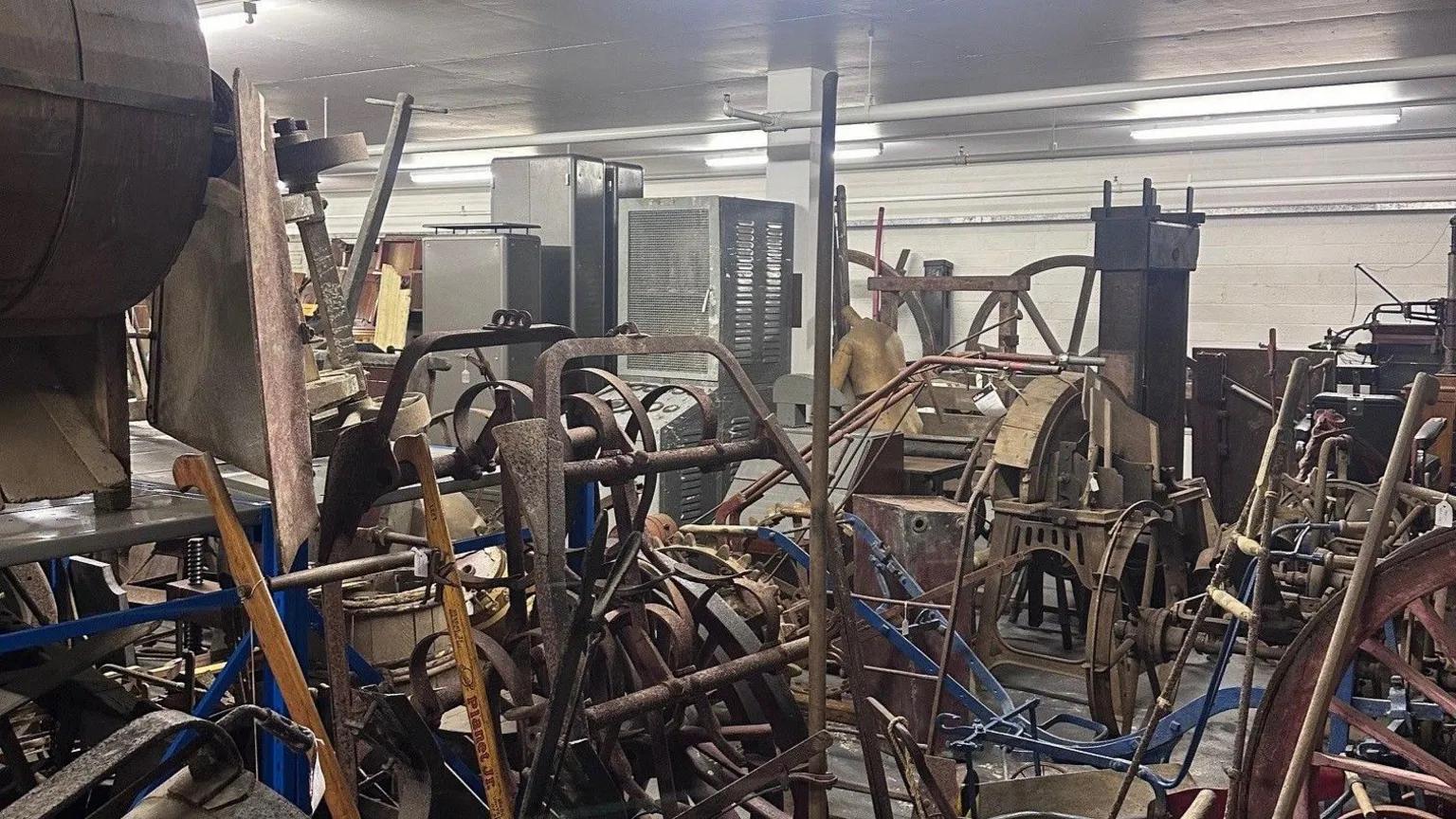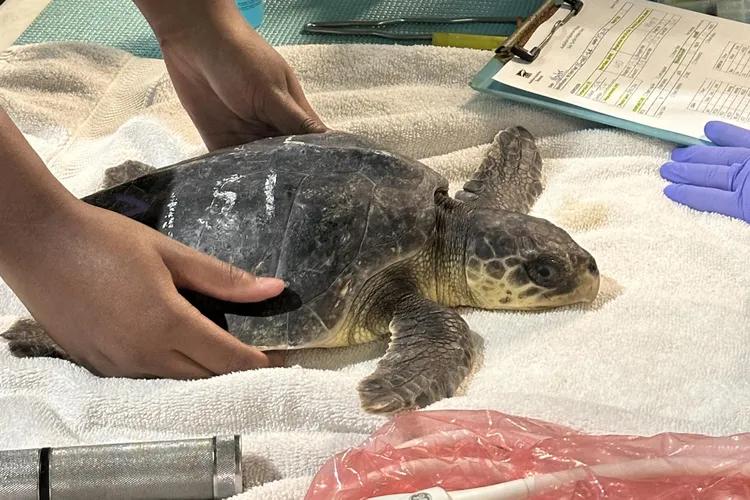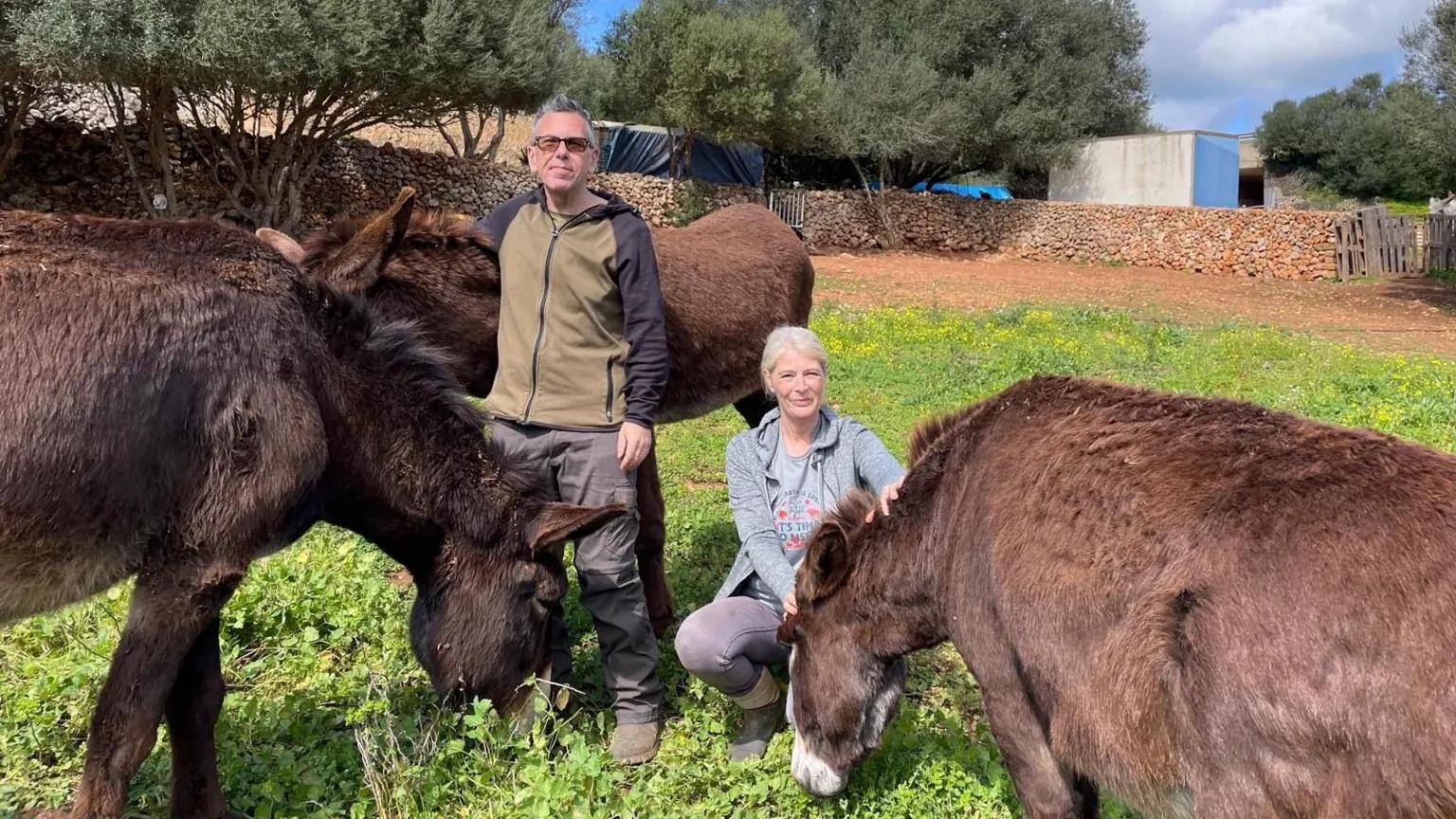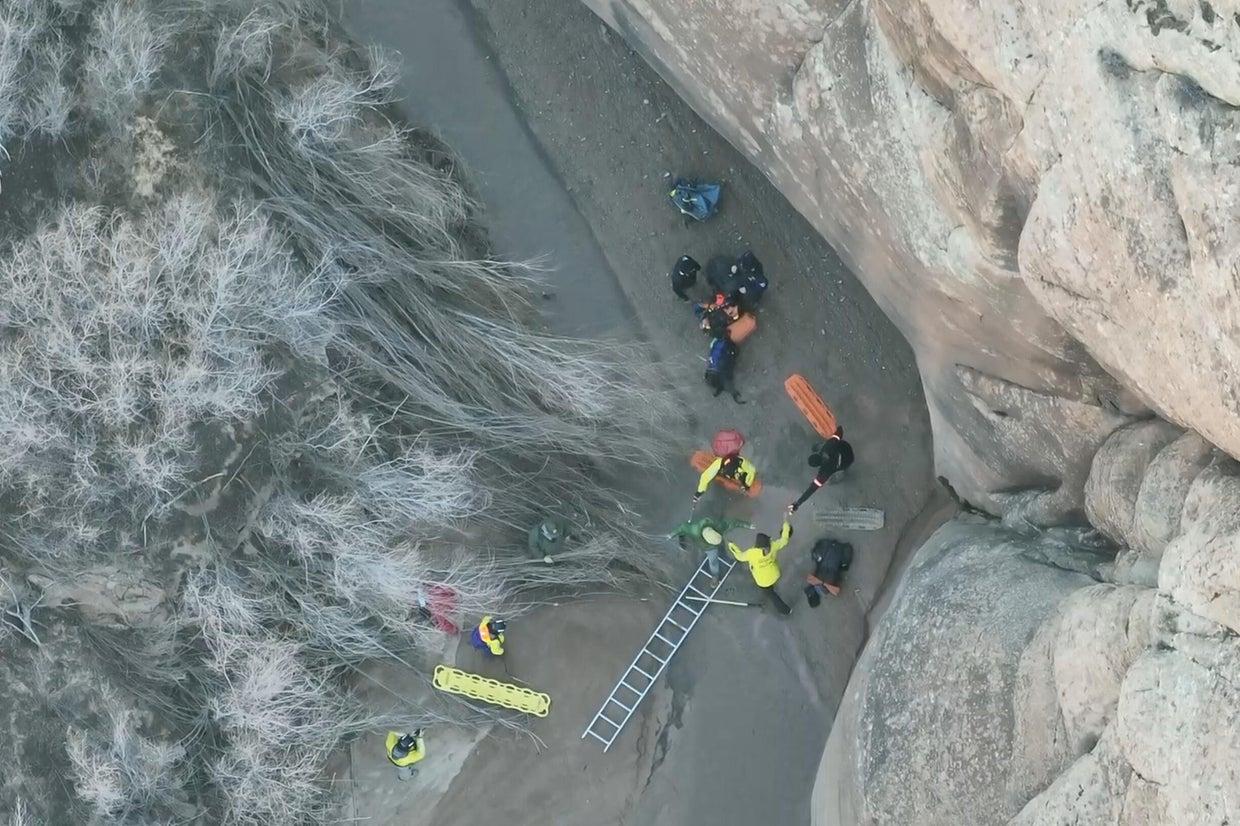Scroll For More

Score (98)
Teen Turns Tragedy Into Triumph As Homelessness Leads to Heroism
Keontrai Floyd, a New Haven teenager who once faced homelessness, is being celebrated for his generosity. He donated $2,000 worth of toys to New Reach, the shelter that supported him and his family during tough times. This act of kindness earned him an official citation from the city's Board of Alders. Floyd expressed gratitude for staying focused on giving back and felt he was helping his younger self by providing Christmas gifts to kids in need. His parents proudly witnessed this moment, with his father calling it a chance to correct past wrongs through his son's actions.

Score (96)
A Solar Stormis Sparking a Spectacular Northern Lights Show Across U.S. This Weekend
The northern lights may return for another round of sky shows this weekend, thanks to a burst of solar activity that could reach Earth as early as Friday night. A pair of moderate solar flares erupted from the sun on Friday morning, Dec. 12, triggering coronal mass ejections — massive clouds of charged particles that can spark vivid auroras when they collide with Earth’s magnetic field. Now, forecasters at NOAA’s Space Weather Prediction Center say conditions could align for another chance to see the aurora borealis across parts of the northern U.S. Friday night offers the best window for viewing, with geomagnetic activity expected to peak between 10 p.m. and 2 a.m. local time. NOAA projects the Kp index, which measures geomagnetic storms, will hit around 4 — strong enough for auroras to be visible in northern-tier states if skies are clear. That means people in parts of Alaska, Washington, Idaho, Montana, North Dakota, South Dakota, Minnesota, Wisconsin, Michigan, Wyoming, and Maine might get a glimpse. The farther north and the darker your location, the better your chances. “Activity is expected to reduce as the weekend progresses,” NOAA said, noting a drop in the Kp index to 3 on Saturday and 2 on Sunday. That means the farther into the weekend, the slimmer the odds for a strong light show. The upcoming auroras follow a surprise G1-class geomagnetic storm Thursday night that briefly lit up skies in some areas. Friday’s solar flares — one classified as M2.0 and another as M1.1 — were more powerful, and scientists are still tracking whether the resulting particle clouds will make a direct hit. For now, the advice is simple: find a dark spot, avoid light pollution, and look up. Let your eyes adjust for at least 30 minutes, and be patient — auroras can shift quickly and unpredictably. Want to snap a photo? Most smartphones can capture auroras using Night Mode or Pro Mode. Turn off the flash, steady your hand (or use a tripod), and shoot toward the northern sky. If you're using a DSLR, try a wide-angle lens and a longer exposure to pick up more color and movement. Whether or not the lights appear, one thing is certain: space weather season is heating up. And with solar activity expected to peak in 2025, there may be plenty more chances to catch nature’s light show.

Score (97)
A Historic Museum Begins Its First Major Clear-Out in 150 Years
For the first time in its 150-year history, Jersey Heritage is conducting a major clean-up of its museum collections — an effort to make space, remove damaged items, and focus on preserving the island’s most meaningful cultural stories. The charity, which manages Jersey’s heritage sites and artifacts, says the project will involve carefully deaccessioning items that are either duplicates or too damaged to repair. The collections, originally started in 1873 by the Société Jersiaise, now hold more than 300,000 items — including, somewhat surprisingly, 199 chairs and 10 bathtubs. Helena Kergozou, senior registrar at Jersey Heritage, said the process is being handled with caution and collaboration. “We are being extremely careful and following a strict set of checks and balances before making any final decisions about what stays and what goes,” she said. That process includes involving conservation specialists and consulting with partners like the Société Jersiaise, who own some of the collection items. “The pieces that we are deaccessioning are being offered to other heritage organisations or charities to use, or they will be recycled,” Kergozou explained. “Only as a last resort will a piece be scrapped altogether — for example, a wooden chair riddled with woodworm.” The goal, she said, is to free up space for future acquisitions and to better protect the items that truly tell the story of Jersey’s heritage. “It’s vital to create room for future pieces and to preserve the island’s incredible story,” she added. Stuart Fell, president of the Société Jersiaise, said the review is long overdue. “Many of the items have been accumulated by the Société since the late 19th century. Some of these are now in very poor condition or have no significant value as museum pieces.” “It makes good sense that such objects should be withdrawn from the collections and disposed of in an appropriate manner,” he said. The clean-out marks a major shift in how the island’s cultural institutions manage heritage — aiming not just to preserve the past, but to make space for the future.

Score (97)
New England Aquarium Saves 35 Endangered Turtles After Cold-Stunning Event
Thirty-five critically endangered sea turtles are getting a second chance at life after being rescued from dangerously cold waters and transported across the country for care. In November, a sharp drop in ocean temperatures in New England left dozens of Kemp’s ridley sea turtles cold-stunned — a condition that renders the reptiles lethargic and immobile. The turtles, unable to swim or dive, floated to the surface and were pushed ashore by waves and wind. Kemp’s ridleys are the world’s most endangered sea turtle species. When they’re exposed to water temperatures below 10°C, they lose their ability to regulate body heat and often suffer from dehydration, pneumonia, and other complications. The 35 turtles were first stabilized at the New England Aquarium’s rescue facility. Once strong enough to travel, they were flown by charter to the Audubon Aquarium Rescue in New Orleans, thanks to support from Greater Good Charities. “Some of these turtles arrived in rough shape; they will need more extensive rehabilitation than others,” said Gabriella Harlamert, the aquarium’s stranding and rehab coordinator. “We are monitoring each of them constantly and are hopeful all 35 of these turtles will heal and return to the Gulf in the spring.” The goal is to release the turtles back into the wild in spring 2026, once Gulf waters warm to a safe level. Each turtle at the aquarium has been named after a rock or mineral — including one dubbed “Opalite,” a nod to Taylor Swift’s favorite gemstone. To keep things festive, the rescue team also created “naughty” and “nice” lists for the season. Jade made the nice list this week after beginning to eat on their own following two weeks of refusing food. Mica, on the other hand, landed on the naughty list for still refusing to eat and resisting help from caregivers. Despite the light-hearted touches, the work is serious. Kemp’s ridley sea turtles are among the rarest sea turtles on Earth, and even a single animal's survival matters. The Audubon Aquarium Rescue is the only facility in Louisiana authorized by the U.S. Fish and Wildlife Service to rehabilitate sea turtles. The team provides round-the-clock care and tracks each turtle’s progress in hopes of eventually reintroducing them to their home waters.

Score (98)
This Youth Choir Just Reunited for One Final Charity Concert — Here's Why
After more than five decades of harmony, the voices of the Hartlepool Youth Choir will come together one last time. The award-winning choir, founded in 1969 by music teacher and conductor Chris Simmons, is reuniting for a final Christmas concert in support of local charities. Former members from the 1970s are travelling from across the country to rehearse and perform at St George’s United Reformed Church on 14 December. Now 81, Simmons said the decision to hold one final performance comes as the demands of organising concerts have become too much. “It is a poignant moment,” he said. “I was supposed to be stopping doing this last year.” That decision was accelerated after Simmons took a heavy fall on the way to a rehearsal last year and spent two weeks in hospital. Fully recovered now, he’s ready to take the stage one last time — carefully. “I told people I would have another go this year and try not to trip,” he joked. “The choir will practice hard and hopefully give a good showing.” The concert will raise funds for Alice House Hospice and the Hartlepool Food Bank. Tickets are £5 and will be available at the door. Founded to give young singers a chance to travel and perform, the choir became a staple of Hartlepool’s musical life. Under Simmons' leadership, it won the International Choral Competition in the former Yugoslavia, the European Youth Choral Competition in Belgium, and toured countries including Canada, the USA, and throughout Europe. In recognition of his decades of musical service, Simmons was appointed MBE in the King’s Birthday Honours list in June. One former member, Beezy Marsh, now 57, remembers the choir as a formative part of her youth. “We were immersed in this amazing world of music,” she said. “Chris believed in us. I remember being just 12 or 13 and singing in Venice after we competed against the Russian State Choir.” Although the final concert will mark the official end of the Hartlepool Youth Choir’s long run, Marsh and others hope the connections built through music won’t fade. “It’s sad bringing the chapter to a close,” she said, “but I hope we’ll still find a way to sing together.”

Score (96)
Beloved Badger Mascot Returns Home After Wild Night Out
Bertie the Badger is back — a little worse for wear, but home safe. The much-loved mascot of the Badger Bar in Rydal, Lake District, vanished earlier this week during a staff Christmas night out in nearby Ambleside. Staff had brought the taxidermy badger along for festivities at the White Lion Hotel on Monday, but at some point during the night, Bertie disappeared. The pub reported him missing, and Cumbria Police issued an appeal. Then the story took off, gaining attention not just across the UK but as far away as the United States. By Friday, the mystery had ended — with a cheerful twist. “Bertie has just staggered back through the front door!” the Badger Bar posted on Facebook. “He seems to have had a merry time, his hat and tinsel have fallen off, and he's not telling what he's been up to. But he's been well looked after and we're grateful for that.” Paul Knowles, owner of the Badger Bar, previously said Bertie had “pride of place” on a shelf near the bar and had become a firm favourite among customers, who often posed for photos with him. The badger’s exact origins are unclear, but Knowles believes he’s been part of the pub for decades. “He's an integral part of the building and the history,” he said. The Badger Bar got its name about 50 years ago, after a sett was discovered in the woods behind the building. Staff would leave out food and regularly spot the animals. As for Bertie’s festive misadventure, he’s keeping his secrets — but his return has been warmly welcomed by staff and locals alike.

Score (97)
Woman Overcomes Fear Of Donkeys, Now Dedicates Life To Their Rescue
When Jane White first arrived in Menorca, she never imagined she’d spend her days feeding donkeys — let alone fall in love with them. “I was originally petrified of donkeys,” Jane admits. But now, caring for them has become her life. Jane, 54, and her husband Dennis, 59, left Leicester six years ago after Dennis was made redundant from a design firm. Looking for a fresh start, they moved to the Spanish island, hoping to build a slower, more fulfilling life. What they didn’t expect was to end up helping run a donkey sanctuary. Shortly after settling into their new home in 2020 — and just days before Spain’s COVID lockdown began — the couple discovered Menorca Donkey Rescue, a self-funded sanctuary nearby. Once restrictions lifted, they visited the sanctuary and found the small team of volunteers overwhelmed. “We realised we really, really loved the animals and the interactions with the people,” said Dennis. Seeing how much help was needed, they offered to pitch in and promote the charity. Before long, they were volunteering every summer. Now, the couple helps Gundi Grass, the woman who founded the sanctuary, care for 17 donkeys. That includes feeding, cleaning, and making sure each donkey is healthy and safe while Gundi works full-time. Dennis says it gave them structure and purpose. “When we moved over, we needed something to do so we could enjoy the days off. We have also met people from all over, and you see the good work the volunteers do, which inspires you to carry on.” For Jane, the transformation was personal. Having grown up with dogs and other domestic animals, donkeys were outside her comfort zone. But everything changed once she got to know them. “All of a sudden, you’re having to feed these big animals and you fall in love with them,” she said. “They’ve all got their own little personalities.” Currently, the land the sanctuary sits on is owned by three private individuals who allow it to be used for free. But the land is now up for sale — and Jane and Dennis are determined to buy it themselves to keep the sanctuary going. They’ve set up a GoFundMe page to raise the money needed and plan to devote even more time to the project. At the moment, it’s just Jane, Dennis, and Gundi running the facility. “We’ve been drawn in,” said Dennis. “It becomes your life.”

Score (97)
From Halifax to Hollywood: How Cirkut Quietly Became One of Music’s Biggest Hitmakers
Before he was helping Lady Gaga craft Grammy-nominated pop anthems, Henry Walter was a quiet teenager in Halifax learning how to scratch vinyl and chop samples. Today, he’s better known as Cirkut — a behind-the-scenes powerhouse whose production credits include some of the biggest songs of the last 15 years. He’s helped shape hits like Katy Perry’s Roar, Miley Cyrus’s Wrecking Ball, and The Weeknd’s Starboy. And this year, with seven Grammy nominations, Walter is finally getting the recognition that’s long followed his work — just not always his name. But for Walter, the path to that stage started with four formative years in Halifax’s music scene. A Halifax Beginning Born in Ottawa and raised mostly in Montreal, Walter moved to Halifax in the early 2000s, attending Armbrae Academy and later St. Patrick’s High School. That’s where he began taking music seriously. “Halifax people and the [music] scene had a big effect on me, for sure,” Walter told CBC News from a studio in Los Angeles. He immersed himself in the city’s local hip hop community, hanging out at Revolution Records, where now-renowned DJ Skratch Bastid (Paul Murphy) worked and performed on turntables when he wasn’t helping customers. Walter would watch closely. “I guess you never do know who’s watching, so as an artist, put your all into what you do and be yourself,” said Murphy, who now lives in Toronto. “And just that might be enough for someone else to be inspired.” Another local artist, DJ IV (Brian Pelrine), also remembers spotting Walter’s talent early. The two met through a mutual friend and started collaborating on a weekly online radio show. They’d spend hours scratching, sampling, and bouncing tracks off each other in a Sunday session they called RTN — Rebel Tactics Network. “The first time I met him, I was just like, ‘Wow, this kid’s really nice with it. Like, he’s very, very talented,’ and he was a savant back then,” said Pelrine. Building Beats, One Sample at a Time Without formal training, Walter taught himself how to make beats by trial and error. He chopped up records, studied how tracks were built, and tried to assemble them into something cohesive. “I was taking records and I was chopping it up, and I was trying to form them together into some semblance of a musical-like composition,” he said. He was always wearing headphones, trying to deconstruct songs to figure out how they worked. Others in Halifax’s scene still remember missing out on the chance to rap over his early beats. Murphy described him as quiet, but never shy. “He just had a good smile about him and he sort of let his work speak for himself in some ways.” The Break That Opened Doors In 2004, Walter moved to Toronto to attend audio engineering school and kept building his skills. Then, in 2008, a phone call from his lawyer changed everything. A CD of his beats had made its way into a writing session — and ended up on Britney Spears’s Circus album. The track? Mmm Papi. “It made me feel like, ‘OK, I’m not crazy. I can do this,’” said Walter. That one placement opened the door to more. He joined the electro-rap group Let’s Go To War as a DJ and co-producer, releasing an album in 2009. But eventually, he realized he didn’t want to perform or tour. “I look back on that and I’m like, ‘Man, I really didn’t know what I was doing.’ But… I can look back and be like, ‘OK, I can see what I was trying to do.’” He kept grinding — even working in call centres to make ends meet — and eventually moved to Los Angeles in 2012. Since then, the hits haven’t stopped. ‘I Love Making Music’ Walter’s calm demeanor extends into the studio, where he describes himself as laid back but open to leading when needed. “Everyone should always feel like they have the ability to throw out any idea and not be… ridiculed for it,” he said. “It’s a safe space to create and kind of do whatever, collaborate.” His recent work with Lady Gaga came through producer Andrew Watt, a longtime collaborator. After working together on a Britney Spears–Elton John project, they teamed up for Gaga’s Mayhem album. “She’s an incredible artist,” said Walter. “I had always wanted to work with her… she’s become just a friend and a close collaborator.” One of the album’s standout tracks, Abracadabra, started with a random beat Walter played during a break in the studio. “She was like, ‘What is that? That’s crazy.’ I’m like, ‘Oh, it’s just this random beat thing I made.’ And she got really excited about it.” That beat became the post-chorus, and Abracadabra went on to earn a nomination for Song of the Year. Recognition at Last Walter is up for seven Grammy Awards in 2026 — including Producer of the Year, Non-Classical, and Album of the Year for Mayhem. Only Kendrick Lamar has more nominations this year. Still, Walter says the awards are just “the cherry on top.” “I love making music,” he said. “I love the process of making music, no matter what.” Pelrine, who still keeps in touch with Walter, sometimes scrolls through his discography online. “Every single hit that I like that was on the radio was made by him,” said Pelrine. “It’s crazy.” And for Walter, it’s still a little surreal. “I’m like, wow, Lady Gaga is sitting right there and she just liked my beat that I just played and we’re making a whole album,” he said. “Like, what is my life?”

Score (98)
The Best From Around The World This Week
From Olympic Housing to Ocean Guardians: 20 of the Week’s Best Good News Stories From repurposed Olympic housing in Milan to a potential Nobel Prize for the planet, here are the most uplifting stories this week, proving that progress is happening all around us — even if it doesn’t always make the headlines. After the 2026 Winter Olympics wrap up in Italy, the main athletes' village in Milan will be converted into student housing, with 1,700 beds including subsidized units for locals. Another village in Cortina will be removed entirely to restore the site to nature. The move reflects a broader shift in how host cities are thinking about sustainability and long-term legacy. Meanwhile in Oklahoma, a longtime school bus driver is knitting custom winter hats and scarves for every child on her route. Tina Hutcherson has already handed out 25 hats, using a knitting machine her daughter gave her. “I just don’t want nobody to be without,” she said. One of the biggest stories this week came out of Detroit, where 88-year-old grocery store worker and veteran Ed Bambas received over $1.7 million in donations after a viral video revealed he had lost his pension and was still working to pay off debt. More than 50,000 strangers contributed. Another remarkable act of generosity: a San Jose couple opened their home to 50 strangers fleeing a nearby mall shooting. “They were like angels,” said one person who found shelter. In global health, a new report shows measles deaths have dropped 88 percent since 2000, saving nearly 59 million lives, thanks largely to vaccinations. Africa stood out for making even more progress, with a 40 percent decline in cases in just five years. On the clean energy front, Connecticut’s Solar Marketplace Assistance Program has funded $145 million in solar projects across schools, towns, and housing developments typically overlooked by private investors. Despite its small size, the state now ranks fifth nationwide for solar power in schools. Portland, Oregon, just approved over $64 million in clean energy grants for 60 nonprofit-led projects. The city’s voter-backed Portland Clean Energy Fund has now committed $1.7 billion to nonprofits tackling everything from sustainable housing to electric vehicle access. And while the debate often pits emotion against reason, a new study shows that empathy and logic together are what most often drive people to help others. That’s also true online: the simple act of opening a browser tab through “Tab for a Cause” has now raised over $2 million for charity. On the philanthropy front, billionaire MacKenzie Scott announced she donated $7.1 billion in 2025 alone — almost triple her previous year’s giving. Most of her donations are no-strings-attached and focused on equity-based causes. Also in the works: a campaign led by climate activists is pushing the Nobel Committee to create a Climate Nobel Prize. Tree-planting nonprofit Ecosia even offered to fund the first €1 million prize if the committee agrees. Other highlights from the week: .• New fossils in Qatar show that “sea cows” like manatees and dugongs have been quietly protecting ocean ecosystems for tens of millions of years. • A Denver middle school cut chronic absenteeism after offering incentives like getting to “pie a teacher.” • U.S. museums and libraries are getting their federal grants reinstated, after previous cuts. • Delta is giving out gift cards to 100,000 people who commit small acts of kindness. • Mexico is raising its minimum wage by 13 percent and planning to limit the workweek to 40 hours by 2030. • This year’s Rhodes Scholars include students focused on housing, health, and sustainability. • Over 230 environmental groups are calling for a national pause on new energy-hungry data centers. • Chile banned smartphone use in schools to improve focus and mental health among kids. • Girls Who Code has now reached 760,000 students, half from underrepresented groups. • New York City tied its record for the longest stretch without a homicide, and saw its lowest-ever number of shootings in 2024. • A major coal-fired power plant in Utah shut down operations with no disruption to energy users. • In India, 118 million women are now receiving unconditional cash transfers for unpaid domestic work. • A Colorado city invested $21 million in affordable housing this year, its biggest-ever one-year commitment. • A gene-editing cancer therapy reversed aggressive blood cancers in some patients, with one still in remission years later. • A Detroit restaurant transformed itself into a full-time art gallery to support Black artists. • A 3D-printed, plant-based surfboard company is reducing microplastic pollution in oceans. • A local school district in Colorado is teaming up with Habitat for Humanity to build affordable homes — and teach students skilled trades at the same time. • A grassroots climate group is supporting local political candidates in city and state elections. • After 16 years of work, volunteers helped red squirrels return to northeastern Scotland. • Finally, in a feel-good moment for London wildlife, white storks are expected to return to the city after being extinct there since 1419.

Score (95)
Rescue Team Saves Hiker From Quicksand in Utah's Arches National Park
It turns out quicksand isn’t just a cliché from Saturday morning cartoons — it’s a real hazard, at least sometimes, in Utah’s Arches National Park. An experienced hiker found that out the hard way last Sunday when he sank up to his thigh in wet, shifting sand while crossing a small canyon. He was on the second day of a 20-mile backpacking trip when he became stuck and couldn’t free himself. Stranded and alone, he activated an emergency satellite beacon. The distress call was relayed to Grand County Search and Rescue, and coordinator John Marshall got the call just after 7 a.m. “I was just rolling out of bed,” Marshall said. “I’m scratching my head, going, ‘Did I hear that right? Did they say quicksand?’” The hiker wasn’t officially named by authorities, but he spoke with Fox13 and identified himself as Austin Dirks. “Before this trip, I honestly thought quicksand was more of a folklore or a legend,” Dirks told the outlet. Dirks had stumbled into a section of wet sand that refilled as quickly as he could dig it away. A park ranger who arrived first had tossed him a shovel, but the flowing muck made self-rescue nearly impossible. Temperatures in the canyon were in the minus-single digits Celsius — and Dirks had been standing in the freezing slurry for hours. Rescuers arrived with a drone, traction boards, a ladder, and backboards. They used the drone to scout the scene, then slowly worked Dirks’ leg free using the boards and ladder for stability. Once free, he was warmed up until he could stand — and remarkably, he hiked out under his own power, carrying his backpack. Dirks later described the experience as very different from the way it’s shown in movies. “The human body is more buoyant than the quicksand, so you’ll never sink to above your head,” he said. Marshall backed that up, explaining that while quicksand can be dangerous, full-body submersion is more myth than reality. “In quicksand you’re extremely buoyant,” he said. “Most people won’t sink past their waist.” Marshall should know — he’s dealt with quicksand rescues before. Back in 2014, he helped rescue a 78-year-old woman who got stuck for over 13 hours in a canyon just two miles from where Dirks had his ordeal. The woman’s book club raised the alarm after she missed a meeting. They found her car at a trailhead and alerted authorities. She made a full recovery. “Both had very happy endings,” Marshall said. Quicksand in Arches National Park may be rare, but it’s not unheard of. The park is better known for its stunning red rock formations and its more than one million visitors a year. Most rescues involve heat exhaustion, broken bones, or lost hikers — not slow-sinking sand traps. Even so, 2025 has been a busy year for the Grand County Search and Rescue team. According to a Facebook post earlier this month, they’ve responded to 140 calls so far this year, racking up nearly 2,900 volunteer hours. Among the more unusual rescues: a canyoneer who got her hair stuck in a rappel device and a couple trapped in their Jeep after trying to drive through a flooded road. As for Dirks, he’s got a story that sounds like it came straight out of a movie — only this time, it’s real.

Score (97)
Grinch, Grotto, and Giving: Families Hand Out Free Food and Gifts for Christmas Kindness
A Nelson, England, family known for decking their house with dazzling lights and a towering inflatable Grinch are once again giving back to the community in a big way—by handing out dozens of free food hampers and Christmas presents to families who need a little extra help this season. Joanne and Andrew Bridge have been running their festive display and giveaway since 2022, after their grandchildren encouraged them to go big with the Christmas decorations. What started as a fun way to light up their street has quickly grown into a full-fledged community event, complete with marshmallow toasting, Santa’s grotto, and a meet-the-Grinch photo opportunity. “We recognise things are hard for people,” said Joanne. “We just wanted to offer something free, something fun, something that helps.” Their event—dubbed The Bridges Who Stole Christmas—is entirely free to attend, and this year the couple set a goal of giving away 80 food parcels over the holidays. They've already handed out 41 in the first week alone. The Bridges’ neighbours, the Meadway family, joined the effort in 2023 and now host Santa’s grotto. Together, the two families have created a festive pop-up unlike anything else in the area. “There’s nothing ever like this around Nelson,” said Courtney Fielding, who brought her kids to the event on Wednesday. “It’s amazing. It’s nice for the community how they do it for free.” In addition to their eye-catching display—which includes a two-storey inflatable Grinch looming over the hedge—the Bridges put together food hampers filled with staples like pasta, coffee, and cereal. The food is packed into washing-up bowls, wrapped in clear plastic, and tied with ribbon. Each one carries a note that reads: “Merry Christmas. In a world where you can be anything, be kind. From our family to yours. #merrybridgemas.” While many visitors offered to donate money, Joanne said the family wasn’t interested in financial gain. Instead, they asked for food donations to help fill the hampers. “We just go with smiles and joy and we are happy to be helping people out,” she said. “It can be quite emotional for some, some embarrassment, but we just want to make it feel normal, generous, and kind.” On the gift-giving side, the Meadways have distributed dozens of presents to families who might otherwise struggle to put gifts under the tree. They've already given away 13 toy packages, with another five scheduled to go out before Christmas. “There’s no judgement,” said Andrew Meadway. “They can come and take what they need for their families. And that way, no kid should go without a present this year.” For kids like Niveya, the experience is pure magic. “It’s really good, and it’s amazing how they put it up,” she said. “It looks really good.” Siblings Benjamin Samuel and Billy agreed. “It’s amazing, it’s proper good,” said Benjamin. “It’s good to make kids happy,” added Billy. The final event of the year will take place on Wednesday evening from 18:30 to 19:30 GMT. The families hope to hand out the rest of their hampers before Christmas, continuing a tradition that has quickly become one of Nelson’s most uplifting holiday stories.